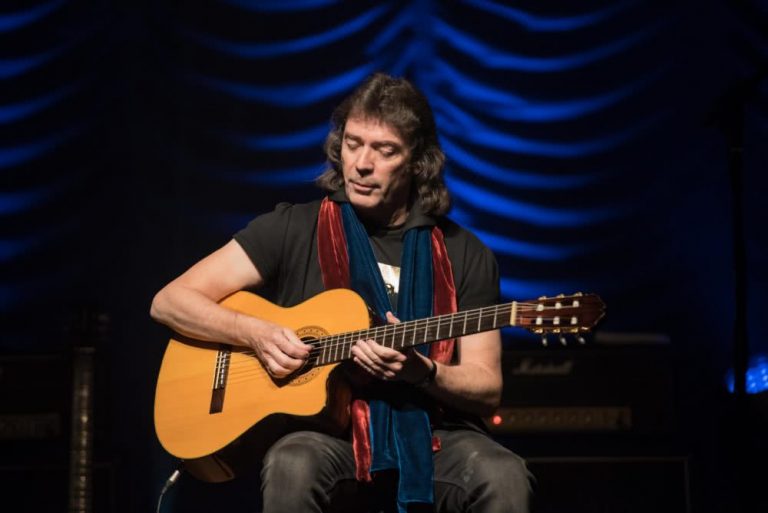A typical English gentleman, Steve Hackett arms himself with a nice cup of tea as he prepares to speak to the BRAG. Nestled comfortably in his London home, the guitarist has spent his morning participating in a slew of interviews regarding his first-ever Australian tour and the release of his new album The Night Siren – a sip of that golden amber provides momentary calm.
Famed as the guitarist of legendary rock band Genesis, recent years have seen Hackett churn out a colossal amount of material, with arguably one of the most important progressive rock bands in music history and as a solo guitarist. Hackett’s Australian tour, titled Genesis Revisited, will be a chance for fans to experience both Genesis’ classic tracks and Hackett’s own discography.
“Music has done extraordinary things to me, and for me, over the years,” says Hackett. “Ever since I was a child my father played musical instruments – since I was two I tried to play harmonica. I could have had 20 different professions from what my dad laid on the table from the time I was knee-high to a grasshopper.”
In essence, Hackett’s trademark variation in style stems from approaching music with an innocent perspective, and looking at it all without prejudice. “[In England] we only had two radio stations,” Hackett recalls. “All music was under one banner and 1950s radio made no distinction … they played Levi’s next to Glenn Miller, so I got up thinking that all music, I don’t see the difference. That carried on in everything into the 1960s, everything from Jimmy Young to Bach.”
I’d jump in with both feet and reinvent myself and start with the really difficult stuff – I thought if I could do this, I could do the simple stuff.
Interestingly, that indifference to genre is one of the ways Hackett’s material has remained so pivotally diverse over the years. “For me, the idea [is that] music has no prejudice,” says Hackett. “What if we lived in a culture of end-of-the-pier music and we were forced into the drink? Forced to do R&B, forced to do dance music … at the end of the day, we have to fight our own prejudices.”
In the new album, The Night Siren, Hackett’s love of Bach is evident; songs like ‘In The Skeleton Gallery’ ring with the traditional elements of classical music while still retaining that rock‘n’roll air. Hackett is stoic about how all music shows no differentiation and that his own is open to interpretation.
“I thought I’d probably hidden the Bach,” he laughs. “It depends on your take on music – if you said to a person that rock and blues music [were the same], which sound nothing like each other, they might think they’re similar indeed. Perhaps to an alien it’s the same, with fast notes in one and in the other.
People didn’t get Genesis at first but then we heard one day that [John] Lennon liked us.
“Maybe the similarities are greater than the differences – again this great word ‘prejudice’, you might say well yeah, it’s shot full of emotion, what about Bach? He’s supposed to be a great mathematician – the concert for two violins, the largo section, it sounds romantic to me, the two melody lines working and intertwined like two lovers. And if that isn’t romantic, I don’t know what is, but he will always be referred to as the quintessential classical composer.
“I think he and Handel knew how to rock out, and in spirit they were jazz musicians!”
Like Bach’s Inventions, Hackett has spent his lifetime reinventing himself on a theme of rock‘n’roll, first with Genesis and then as a solo artist. “Music was something I thoroughly researched and, like Michelangelo, I learned to sketch in a number of styles and at times to go more purist and record in unfamiliar styles. I’d jump in with both feet and reinvent myself and start with the really difficult stuff – I thought if I could do this, I could do the simple stuff. Tribute is one of the most important records I’m proud of – six pieces, Bach, Scarlatti, Byrd; the livelier stuff I’ve recorded is from that time. It’s a lot like archaeology, like you’re interpreting hieroglyphics, but these guys, they’re looking for someone outside of the box. Today we’re trying to operate outside of the box and try and create something new.
What if we lived in a culture of end-of-the-pier music and we were forced into the drink? Forced to do R&B, forced to do dance music … at the end of the day, we have to fight our own prejudices.
“It’s funny, people mention that track [‘In The Skeleton Gallery’] – there’ve been times I’ve done things for me [but] people had responded with their cut to that and their response is a great mystery to me. All music is a shot in the dark, people might not get it at first. People didn’t get Genesis at first but then we heard one day that [John] Lennon liked us. I think the reality was they asked him in 1973 on radio who he was listening to and he said he was listening to us. We’ll never know what he was listening to; maybe he was trying to be hip, but it was a feather in the cap.”
Hackett has made a stellar career out of a passion for music history. This is a man who, despite having had no formal training in classical music, looks back to the composers of old as an endless source of inspiration and technical theory, and discusses their work with unique eloquence.
“I prefer not to think that I speak with eloquence, that I talk about it with passion – I don’t know enough about it to be eloquent!”
Steve Hackett performs Genesis Revisited at the Enmore Theatre on Friday August 4. His solo album The Night Siren is out now through InsideOut Records.


































